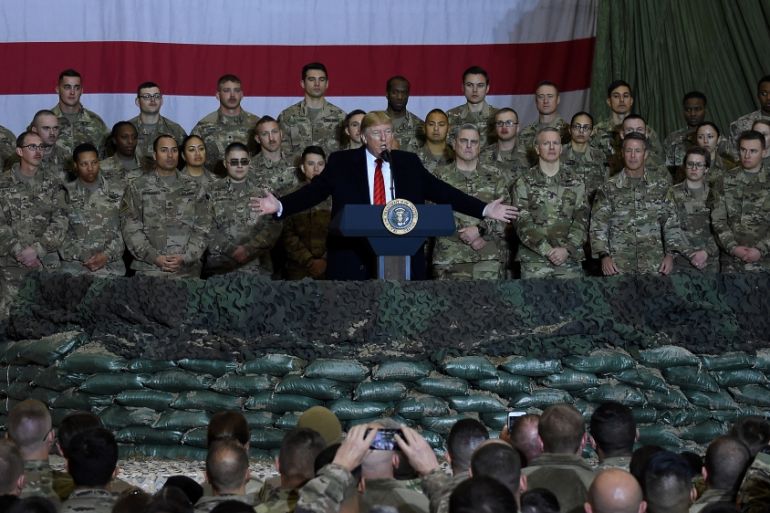Trump officials defend response to Russia-Taliban intelligence
Trump remained defensive about the intelligence, dismissing stories about it as ‘Fake News’ made up to ‘damage me’.

The Trump administration has stepped up the defence of its response to intelligence assessments that suggested Russia had offered bounties for killing US troops in Afghanistan, with the president’s national security adviser saying on Wednesday that he had prepared a list of retaliatory options if the intelligence had been corroborated.
President Donald Trump continued to play down the assessments, and has insisted he was not briefed on the matter because the intelligence did not rise to his level.
Keep reading
list of 4 itemsPhotos: Tourist numbers up in post-war Afghanistan
Taliban ban on girls’ education defies both worldly and religious logic
Afghanistan calls for ‘respect’ after Cricket Australia snub
“Many of the intelligence people didn’t think it was something that even happened,” Trump said in an interview with Fox Business Network. “This was something that never got presented to me … because it didn’t rise to that level.”
American intelligence intercepted evidence that Russia placed bounties on American troops' heads for Taliban-linked militants.
Trump called that intelligence a "hoax."
WATCH: pic.twitter.com/mREGIcYjUB
— DNC War Room (@DNCWarRoom) July 1, 2020
However, National Security Adviser Robert O’Brien said both the CIA and Pentagon did pursue the lead and briefed international allies.
“These are important allegations that, if they’re verified I can guarantee you, the president will take strong action. We’ve been working for several months on options,” O’Brien told reporters outside the White House, though he added Washington might never know the truth of the matter because of media leaks.
At a State Department news conference, Secretary of State Mike Pompeo said the situation was handled “incredibly well” to ensure the safety of US troops.
“We took this seriously; we handled it appropriately,” Pompeo said. He said the administration receives intelligence about threats to Americans “every single day” and that each is addressed.
|
|
Pompeo added that Russian activity in Afghanistan is nothing new and that Russia is just one of many nations acting there. He said Congress has had similar information in the past, and that he often receives threat assessments that do not rise to the level of a presidential briefing.
The comments from administration officials come as Trump is coming under increasing pressure from legislators of both parties to provide more answers about the intelligence and the US response or lack of one. Democrats, who were briefed at the White House on Tuesday, suggested Trump was bowing to Russian President Vladimir Putin at the risk of US soldiers’ lives.
Trump remained defensive about the intelligence, dismissing stories about it as “Fake News” made up to “damage me and the Republican Party”.
“No corroborating evidence to back reports.” Department of Defense. Do people still not understand that this is all a made up Fake News Media Hoax started to slander me & the Republican Party. I was never briefed because any info that they may have had did not rise to that level
— Donald J. Trump (@realDonaldTrump) July 1, 2020
Senate Republicans appeared split on the matter, with several defending the president and saying that the Russian meddling was not new. Others expressed strong concern.
“If reports are true that Russia has been paying a bounty to the Taliban to kill American soldiers, this is a serious escalation,” Iowa Senator Chuck Grassley said on the Senate floor. “It demands a strong response, and I don’t mean a diplomatic response.”
Senate Republicans, who received their own briefing, largely defended the president. Senate Armed Services Chairman Jim Inhofe of Oklahoma said he was convinced Trump had not known about the intelligence, and Wisconsin Senator Ron Johnson, chairman of the Homeland Security and Governmental Affairs Committee, said Trump “can’t be made aware of every piece of unverified intelligence”.
The White House was working on scheduling a briefing with the so-called “Gang of 8” in Congress – Senate Majority Leader Mitch McConnell, House Speaker Nancy Pelosi and the top Republicans and Democrats on the two intelligence committees. The meeting is tentatively scheduled for Thursday.
A U.S. intelligence report has also circulated on Capitol Hill and throughout the national security apparatus over the last several days, focusing generally on how Russia provides support, including financial assistance, to the Taliban https://t.co/OU68Jnf2wa
— The Daily Beast (@thedailybeast) July 1, 2020
While Russian meddling in Afghanistan is not new, officials said Russian operatives had become more aggressive in their desire to contract with the Taliban and members of the Haqqani Network, a violent group aligned with the Taliban in Afghanistan and designated a “Foreign Terrorist Organization” in 2012 by the US.
The intelligence community has been investigating an April 2019 attack on an American convoy that killed three US Marines when a car rigged with explosives detonated near their armoured vehicles as they travelled back to Bagram Airfield.